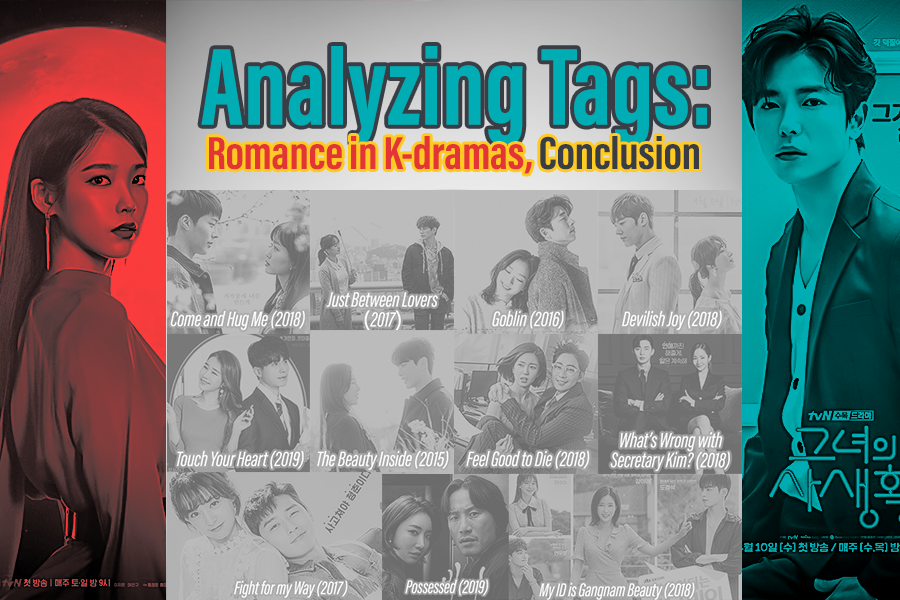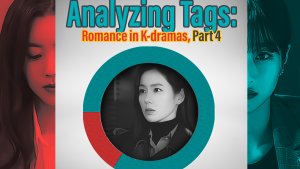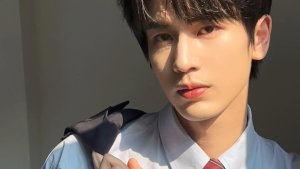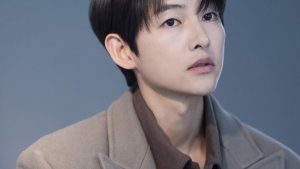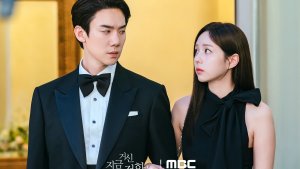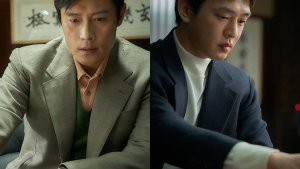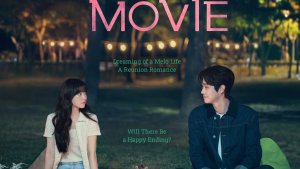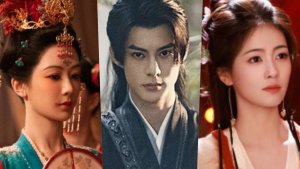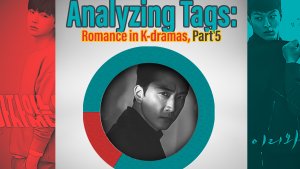 A Tag Analysis: Romance in K-dramas, Part 5
A Tag Analysis: Romance in K-dramas, Part 5
Dear readers,
Better late than ever, right? It's been several months since I started this article and it was only until now I had enough time to finish it. So, after more than a year since this journey started, I present to you the final installation of Analyzing Tags! For those unfamiliar with this series of articles, here's a table of content for what became a massive (and obsessive) analysis of Romance K-Dramas.
Analyzing Tags: Romance in K-dramas | |
PART 01An overview of the Romance genre that focuses on the formulas used in K-dramas and how we can interpret them within the genre. Specifically, we go over the following tags: "Love Triangle", "Lead Chasing" and "Age Gap". | |
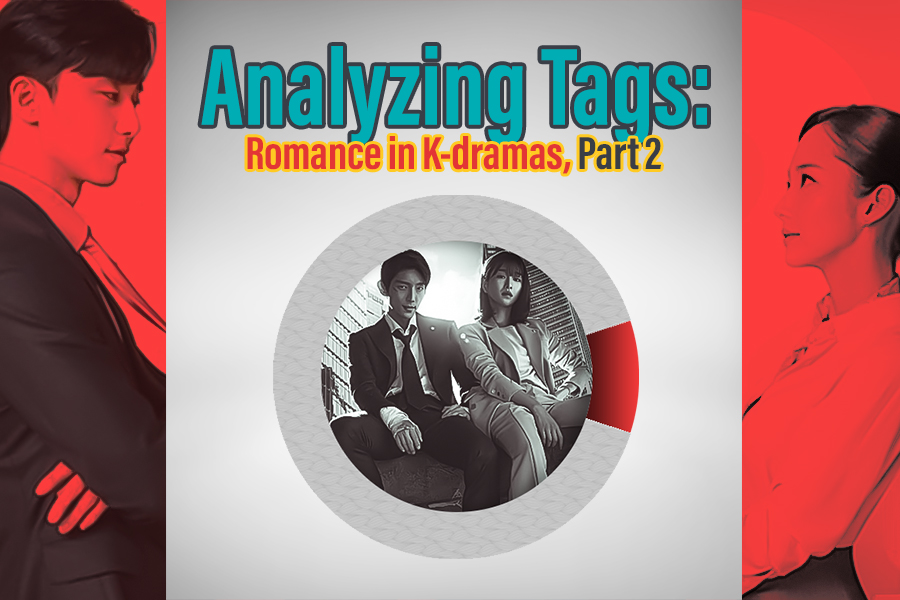 | PART 02Continues the overview of the formulas used in K-dramas by analyzing the following tags: "Office Romance", "Boss/Employee Relationship," "Cohabitation" and "Childhood Connection". |
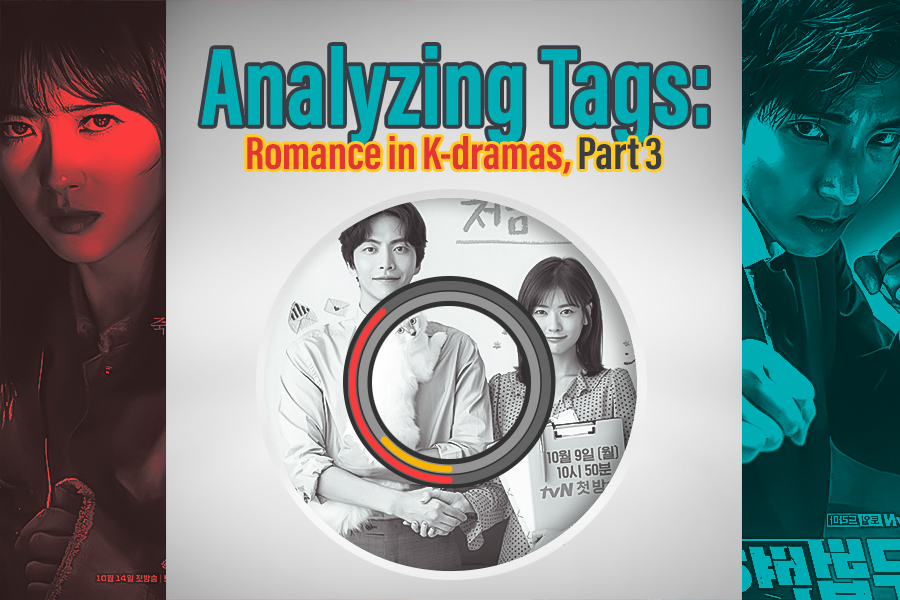 | PART 03Focuses on the tags related to the characters; specifically how we tag a female lead vs a male lead when it comes to Romance. Here we will cover the "friendship" tag which includes: "Bromance" & "Sismance" as well as go through the Money-Related (Poor & Rich Leads) and Financial Discrepancy (Poor Lead/Rich Lead) tags. |
 | PART 04This article serves as an overview of both negative and positive attribute tags (strong, weak, smart, etc.) that refer/apply to Female Leads. The purpose is to give an insight into how the audience perceives Female Leads when it comes to romance. |
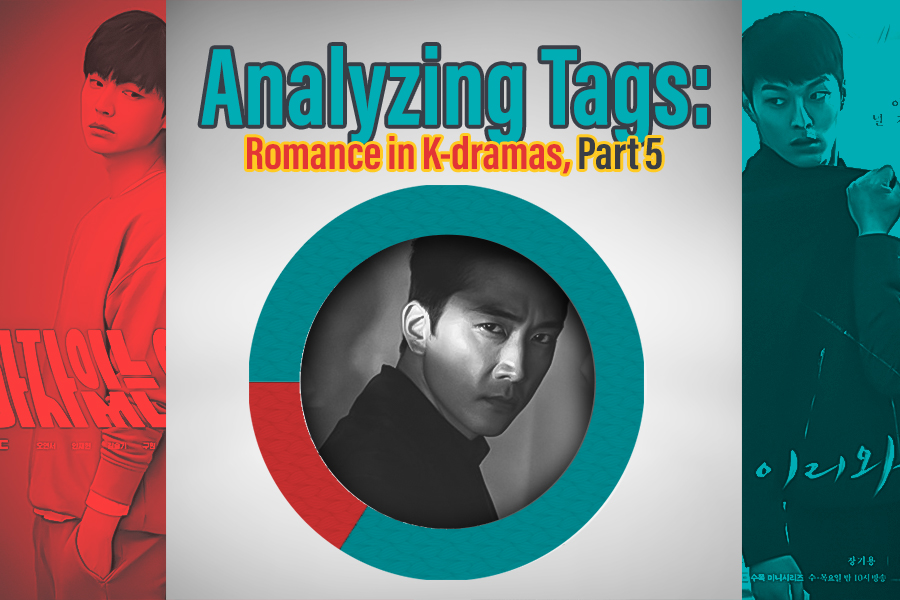 | PART 05This article serves as an overview of both negative and positive attribute tags (strong, weak, smart, etc.) that refer/apply to Male Leads. The purpose is to give an insight into how the audience perceives Male Leads when it comes to romance. |
PART 06 | Conclusion (current article)This article will wrap things up by analyzing the data regarding Male and Female Leads in order to compare what users and drama-creators focus on when considering the genders and why being aware of this may be important. | |
Though these articles can be read as stand-alone in whichever order you choose, I highly encourage you to read Part 04 & Part 05 before or after this one so you have a better understanding of some of the numbers depicted in this article.
Having said that, I'm not going to focus too much on the numbers this time around, since that has been covered already. Instead, I'm going to offer my personal interpretation based on the data collected and my experience watching K-Dramas.
And because this is a conclusion, I want to be clear that this is going to be a heavily subjective thought piece that I hope will offer some food for reflection or --better yet!-- some grounds for a healthy discussion.
Without further ado, let's jump into it, shall we?

As you can imagine, collecting the data for this series was a massive enterprise. @Lua helped out a ton when we started this, but after I fell off the grid, I had to continue the series on my own. After my break, I opted to re-evaluate my sample. Especially as I was heading towards the part I was most interested in analyzing:
Male Leads vs Female Leads, how do they compare?
The main focus of this article, therefore, is to compare and contrast my findings when it comes to not only how but why audiences choose certain tags based on gender. And, as you can imagine, this also ties in with how writers treat Male Leads versus Female Leads. And let's just say that the following analysis may surprise you and, if you're an optimist, it will probably disappoint you as well.
Now, I want to make something clear. The intention of this article isn't to bash dramas or writers. Instead, I hope to make audiences aware of a gender discrepancy that's prevalent in Romance K-Dramas. Some of the points I'll discuss you may already be aware of (even if unconsciously), others you may not have thought about and, thus, you may find intriguing. However, don't be sad if you like a drama that unconsciously promotes a message you don't subscribe to. Dramas are fictional, after all, so some leeway is to be had.
So let's start with looking at how Female Leads are constructed and, consequently, how they are treated by K-Drama writers, shall we?
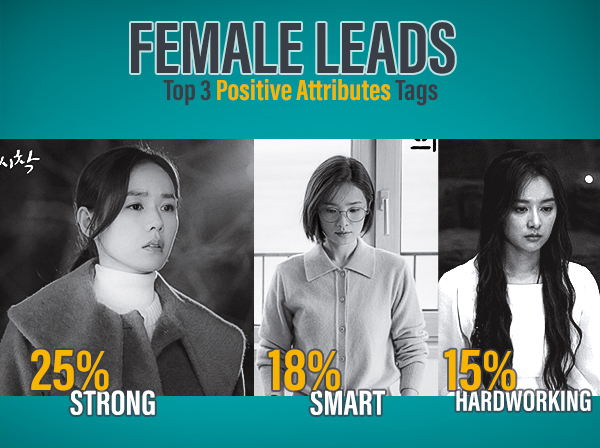 | |
We've established that almost 8 out of 10 times a Female Lead will be tagged positively.We've also gone over the data that indicates Strong, Smart, and Hardworking are the three most recurrent attributes when it comes to tagging Female Leads. In fact, from within our sample of dramas... | |
 | |
But why should that be surprising?The data actually makes perfect sense once we take a look at why Female Leads need to be Strong, Smart, and Hardworking. The answer lies in how they are defined by K-Drama writers, because... | |
 | |
Yes, it's that simple. Think about the last five Romance K-Dramas you watched. Have you noticed how often Female Leads are introduced at their weakest or through a montage of vulnerable moments? While some dramas may introduce the Female Lead with a bang (usually hitting someone or with a feat of strength), it's rare for her to remain at that peak of success, popularity, power, and/or, wealth during the first quarter of the drama. Typically, during episodes 1 to 4, most dramas will push onto the Female Lead some kind of trial and tribulation that puts her in a precarious position. This usually involves one or several of the following scenarios:
Most times, the exception to the rule can often be found in dramas that involve Crime + Romance. But although we may get to greet the Female Lead through a display of skill or wit, we may also soon see her pay some sort of consequences (sometimes that may entail losing her job, for example). If I have yet to convenience you, here are some examples of how Female Leads are introduced during the first or second episode of several recent romance dramas: | |
 |  |
| In Angel's Last Mission: Love, the Female Lead gets introduced through a montage that shows how angry she is at life after having lost her sight. Not only did the accident rid her of her ballet career (while she was at the peak of success) but it also turned her into an orphan. So the Female Lead is left stranded and purposeless. We can see a similar scenario play in: Are You Human Too? (an injury cuts her MMA career short), Doctor John (stops being a doctor due to trauma), Dr. Romantic (an accident and trauma force her to remain stationary when it comes to building her career), Forest (a childhood trauma keeps her from building her career), and Thirty But Seventeen (a coma cut her violin career short). | In Romance is a Bonus Book, we quickly learn the Female Lead got divorced and is now living in an abandoned house with nothing to her name save her pride. Too embarrassed to ask her friend for help or even tell her daughter (who is studying abroad) of her situation, we see her struggle to find a job in a culture that asks women to raise children then punishes them for becoming "stay at home" mothers or daring to want to be successful. We can see a similar scenario play in Bad Papa (she can't become a writer), Because This Is My First Life (becomes homeless and has a hard time finding a job), Cunning Single Lady (she's barely making meet ends and then she's judged for trying to find a job), Twenty Again (she's judged for going back to school after getting a divorce and realizing nobody needs her), and When the Camellia Blooms (she's looked down upon and judged for being a single mother). |
 |  |
| In Touch Your Heart, we see the Female Lead (a popular and successful actress) lose her career due to a scandal wherein she was falsely accused of taking drugs. She then has to do all sorts of things to try and recover her dwindling career. We can see the same type of scenario play in Devilish Joy, The Greatest Love, You Who Came from the Stars, It's Okay to Not Be Okay, Jugglers, Soul Mechanic, and to a certain extent in Queen In Hyun's Man. | In Lie After Lie, we watch as the Female Lead loses everything in the blink of an eye. Not only is she a victim of domestic abuse, but she ends up being accused of killing her husband and lands in prison. To make matters worse, she's forced to give up her baby. We can also see this type of scenario play in Secret (falsely accused), Love in Sadness (she's a victim of domestic abuse), Let Me Introduce Her (also a victim of domestic abuse), and Suspicious Partner (falsely accused). |
I'm sure you can think of even more dramas where the Female Lead is introduced through the depiction of a hardship. In fact, you may have a harder time thinking of Dramas where she's introduced at the peak of her power and remains there.
This leads us to compare how Male Leads are constructed and how they are treated by K-Drama writers.
 | |
We've established that 8 out of 10 times a Male Lead will be tagged positively.We've also gone over the data that indicates Nice, Smart, and Calm are the three most recurrent attributes when it comes to tagging Male Leads. In fact, from within our sample of dramas... | |
 | |
Again, why should this be surprising?The data actually makes sense once we take a look at why Male Leads need to be Nice. Or rather, how Male Leads are defined. And that's because... | |
 | |
| Again, think about the last five Romance K-Dramas you've watched. Ever noticed how often Male Leads are introduced at their strongest or through a showcase of skill, wealth, or success? Heck, sometimes we may even get a combination of it all, ensuring we understand the Male Lead is at the top of his game! While some dramas may introduce a Male Lead during a moment of vulnerability, there's a high chance that we will see him recover some if not all of his power before the end of the drama. Still, during the first quarter of its run, most romance K-Dramas will introduce the Male Lead at the top of his chosen career.
If I have yet to convenience you, here are some examples of how Male Leads are introduced during the first or second episode of several romance dramas: | |
 |  |
| In Lawless Lawyer, the Male Lead gets introduced through a montage of badassery. We get to see him talk himself out of a traffic ticket shortly before this scene. Then after this scene, we get to see him fight against those thugs, showing off not only his confidence but some serious combat ability as well. This type of scenario tends to be the go-to way to introduce male characters when it comes to dramas that also involve a criminal element. | In Forest, we see the Male Lead arrive in a luxurious car complete with a driver and a secretary at his heel. Then he pops into this room and basically shuts everyone up with a flaunt of style and knowledge. This type of scenario where the ML dominates over a group of businessmen is typical of any drama that involves office work and/or business. |
 |  |
| In Doctor John, we get introduced to our Male Lead via an unconventional but impressive show of skills. Take note that usually when the Male does something extraordinary, even if he tries to play it off or be anonymous, other characters are bound to remark upon how amazed they are. So after this scene, the guards actually reveal to us who saved this man's life. This is also a typical way to introduce Male Leads, especially when it comes to medical dramas. | In Tale of the Nine-Tailed, the Male Lead is introduced with a montage showing off not only his gorgeous looks but his life of luxury and wealth. This type of scenario is also quite common, especially in romance focus dramas or when a protagonist is renowned at something. A similar scenario to this is when we meet the Male Lead through an interview done by a reporter for either the news or a magazine. |
So now that we've established how each gender is constructed and defined, we can conclude that... | |
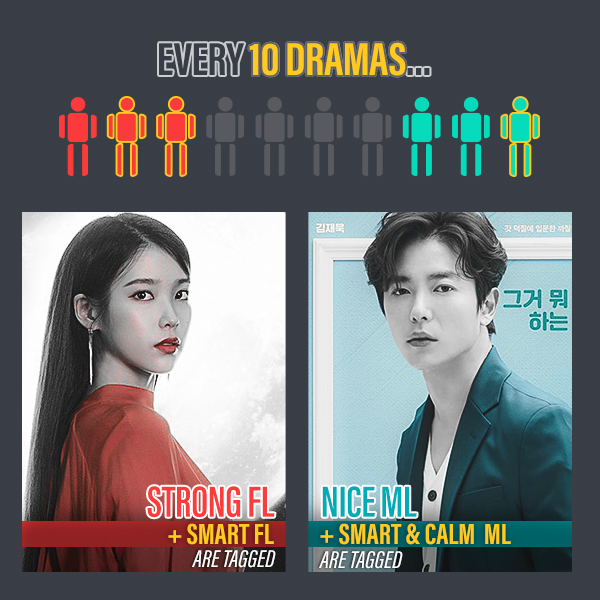 | |
AND THIS IS BECAUSE... | |
 |  |
To further solidify these points, let's take a quick look at how each gender's most used attribute compares in usage against its opposite gender.
 | |||
As you can see, Male Leads aren't tagged as Strong as frequently.This doesn't mean that untagged Male Leads aren't strong. Instead, this might be a result of writers sparing Male Leads from facing real hardships. And I mean hardships that are so difficult to overcome, that the characters require help or at least struggle for several episodes while somehow keeping themselves from drowning in hopelessness. But since Male Leads tend to be written so strong and perfect, hardships that should make them sweat are hard to come by. Or rather, their perfect build ensures they are almost always at their strongest. And because they are always strong, their strength isn't really memorable. Sometimes writers may go as far as to build a faux weakness scene, wherein we're shown or told the Male Lead is suffering, only for him to recover in record time. This can come across as an unwillingness of a writer to have his or her male character be perceived as weak. At the same time, writers may give the Female Leads an opposite treatment, wherein we're shown a faux strength scene. Usually, we'll have the Female Lead act strong while simultaneously trapping her in a damsel-in-distress scenario so the Male Lead can swoop in to save her. Here are some examples of this: | |||
Lawless Attorney, 2020 | Tale of the Nine-Tailed, 2020 | ||
 |  | ||
Faux Strenght | Faux Weakness | ||
| Female Leads, on the other hand, are usually written with tons of flaws. And although we may want to file that as unfair, that actually makes them more compelling and complex than their male counterpart. Unfortunately, writers also tend to make them passive when it comes to facing problems and that, more than their flaws, is what should annoy you. Because that makes them a victim of their circumstances and strips them of their sense of agency. Male Leads, on the other hand, are less complex and interest as far as characters go; especially if they have been built with more strengths than faults (which is usually the case). However, it's extremely rare to find a Male Lead (this extends to the Second Male Lead as well) who has been written as passive --and that makes them more important to the plot. Because Male Leads are actively engaged in solving problems and dealing with situations, furthering the plot with their sense of agency. Take a look at these comparisons from 2020's Tale of the Nine-Tail. These scenes actually happen during the same episodes. Notice how the Female Lead is shown passive whereas the Male Lead and Second Male Lead take an active role in getting out of their situation: | |||
 |  | ||
Passive | Active | ||
 |  | ||
| We can see a similar thing happening in the 2020 Drama, Was it Love?, wherein the Second Male Lead puts up a good fight while the Female Lead gets taken out in record time. | |||
 |  | ||
Passive | Active | ||
| Another thing of note is that, even when Female Characters are active in solving their problems, they still need someone to help (usually a male). Whereas Male Leads are shown capable of taking care of their own problems. Take a look at the following example of the 2020's Private Lives. | |||
 |  | ||
2FL Needs Help | ML is a One Man Army | ||
| So because Female Leads are built normally when it comes to strength, when they actually manage to overcome their problem(s) --if they have been written as active participants in the solution, that is-- then they'll pull through via a moment of strength. And that makes us, the audience, take note of that strength and tag the character as strong. Because that --which breaks from the default-- becomes memorable. | |||
So, if we explore that train of thought then... | |||
 |  | ||
 |  |
 |  |
 Flower of Evil, 2020 |  Catch the Ghost, 2020 |
 Search, 2020 (not a Romance K-Drama) |  Posessed, 2019 |
Now, let's take a look at the Male Lead's most used attribute and how it compares when applied to the Female Lead.
 | |||
Female Leads are tagged as Nice half as frequently.This doesn't mean that untagged Female Leads aren't nice or that they're all mean. Instead, this might be a result of writers having Female Leads constantly facing hardships, which doesn't give a lot of room for them to simply be nice --or that niceness to be out of place enough for us to perceive it as unusual.Typically, Female Leads are shown in complete despair at their unfortunate circumstances and that's where Male Leads come in. Male Leads are always in a better position than Female Lead in regards to power, skills, and overall life circumstances. So they can easily lend the Female Lead a hand. And because many times Male Leads help Female Leads without expecting anything in return, the audience perceives their magnanimous gesture as nice and we tag it as such. Now, I may have phrased that negatively, but it's not. The only negative thing is the fact that the power imbalance between the genders is usually portrayed as romantic.It's basically the cinderella formula over and over again, which we can also regard as the Knight in Shining Armor trope. | |||
So, if we explore that train of thought then... | |||
 |  | ||
Interesting, isn't it?
I'm really curious to read what you're thoughts are on this. In a way, I feel oftentimes Female Leads can't afford to be nice because they are dealing with problems after problems. And those who are nice, are written sweet by nature, which makes their good gestures part of their default state.
Male Leads --especially those shown as dominant or successful, are not nice by default. Instead, they become nice once they meet the Female Lead. Or, sometimes, they become nice only to the Female Lead --which makes them break their habit enough for the audience to take notice of it and tag them as nice.
This leads me to briefly cover two other observations I've made while watching dramas this year. Since I've started the journey of these articles, I've been more active than usual in reflecting on why Korean scriptwriters make their decision; rather than just focusing on the outcome of those decisions.
REBELLING AGAINST THE AUTHORITY | |
| Have you ever thought about what happens when our leads rebel against a figure of authority during a drama? The figure of authority is usually a superior at work or a politician everyone else is trying to keep happy. As you can imagine, the result of that rebellion is quite jarring when we compare how the genders are treated in its aftermath. Consider the following examples, which are a small sample of my point: | |
Angel's Last Mission: Love, 2020 | |
 |  |
| Kim Dan is an optimistic, carefree angel who is always getting into trouble. As part of his introduction, we're treated to his superior berating him for not following the rules. Of course, we get to watch a fun montage of all the rules Kim Dan has broken as they go over each case one by one. Notice how his superior doesn't really seem angry. In fact, the entire scene has been written so we can be both amused by the Male Lead's laidback attitude at his acts of rebellion and, at the same time, to make it clear Kim Dan is a nice To the surprise of no one, he doesn't really get punished. | Ha Jae Yi is a young lawyer who believes the law is sacred and fights for justice. We are introduced to her character through a trial scene in which her client --a victim of domestic abuse-- is found guilty and sentenced to jail. Disgruntled by an outcome she considers unfair, Ha Jae confronts the judge after everyone has left. In typical K-Drama fashion, the judge throws political correctness to the wind and dishes out some incredibly sexist remarks. His rude words cause Ha Jae to lose her temper and punch him in the face. Unfortunately, in the next scene, we see Ha Jae getting her license suspended and losing her job. After which, Ha Jae returns home and soon gets recruited by Bong Sang Pil (the Male Lead), who has just set up his own agency. |
 |  |
| A legend among his peers Do Jung Woo is the leader of one of the National Police Agency’s special task forces. During the first episode, we see him rebel against & question rules and regulations twice. Although he's called into his superior's office, his reprimand is mild and written to amuse the audience rather than to humiliate Jung Woo. In fact, Jung Woo can afford to stay cool and uncontrived in the face of his reprimand. And we even see him dodging a ball during this scene, which causes his chief to destroy his favorite plant. | During a party with her former classmates, Oh Mi Joo gets into an argument with one of her former professors. Drunk and irritated, he throws his drink at our Female Lead after mishearing her. Fed up, Oh Mi stands up to him and calls him out on his sexist comments and his childish behavior. Unfortunately, the very next day she's greeted with the news that she lost her gig after the Professor talked to her client and stole the job from her. We later see a desperate Oh Mi visiting the professor, apologizing, and begging him not to take her job away. |
If the point I want to make isn't obvious, then the following graphics should drive it home... | |
 |  |
While I only showed four examples, I'm quite sure you can think of more. Of course, it's always more jarring when a Drama shows the Female Lead being punished for dismissing regulation while lightly reprimanding, or at times flat-out rewarding, the Male Lead for doing the same.
What do you think about this observation? Do you agree or disagree? If you agree, have you noticed this before as well or is this something you hadn't really thought about until now? Share your thoughts in the comments down below!
Now, let's jump into the last observation I want to share with you regarding how differently a character is treated by the writers based on their genders...
DREAM, GOALS & ASPIRATIONS | |
| The next observation has to do with our protagonists' goals. More specifically, how drama treats the Female Lead's aspirations versus the Male Lead's. Let's start by pointing out that usually when the Male Lead has a dream or goal, that will be either the main component of the plot or at least a big part of what needs to be resolved. Meaning, the Male Lead's dream oftentimes becomes the heart of the Drama. Therefore, the plot is built around that with the objective of having the Male Lead accomplish his goal. On the other hand, when the Female Lead has a dream or goal, it's usually a small part (subplot) of the overall story. It's actually rare for her dream to be at the center of the story, so there's, therefore, no assurance that she may get to accomplish her goal. When the Female Lead is not meant to achieve her goal... at best, her aspirations will change in order to sync up with the Male Lead's aspirations. But at worst, she may end up giving up on her dream and settling for doing something else instead. Let's take a look at a recent example which I know disappointed many (me included), shall we? | |
 |  |
| For the first part of this drama, there was a notable focus on the differences between Song Ah (FL) and Joon Young (ML). Both of them musicians, they have not only been introduced as being in different levels altogether (her a rookie; him a renowned pianist), but they were also opposite in how they approach music. | |
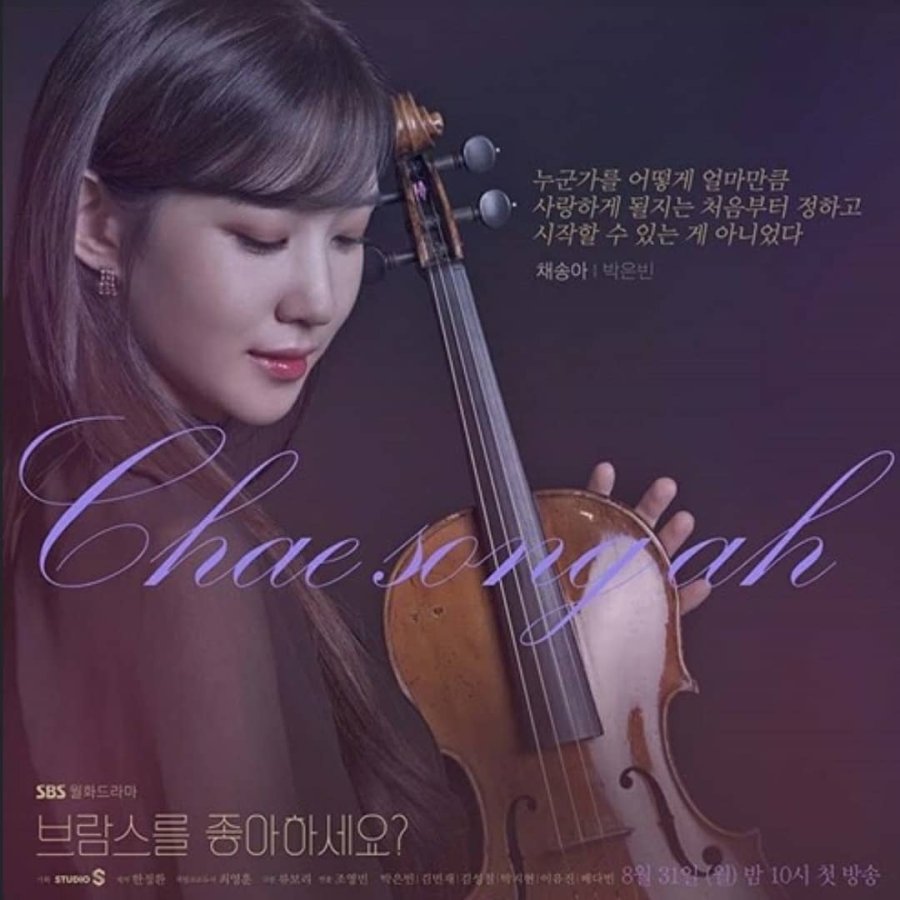 | 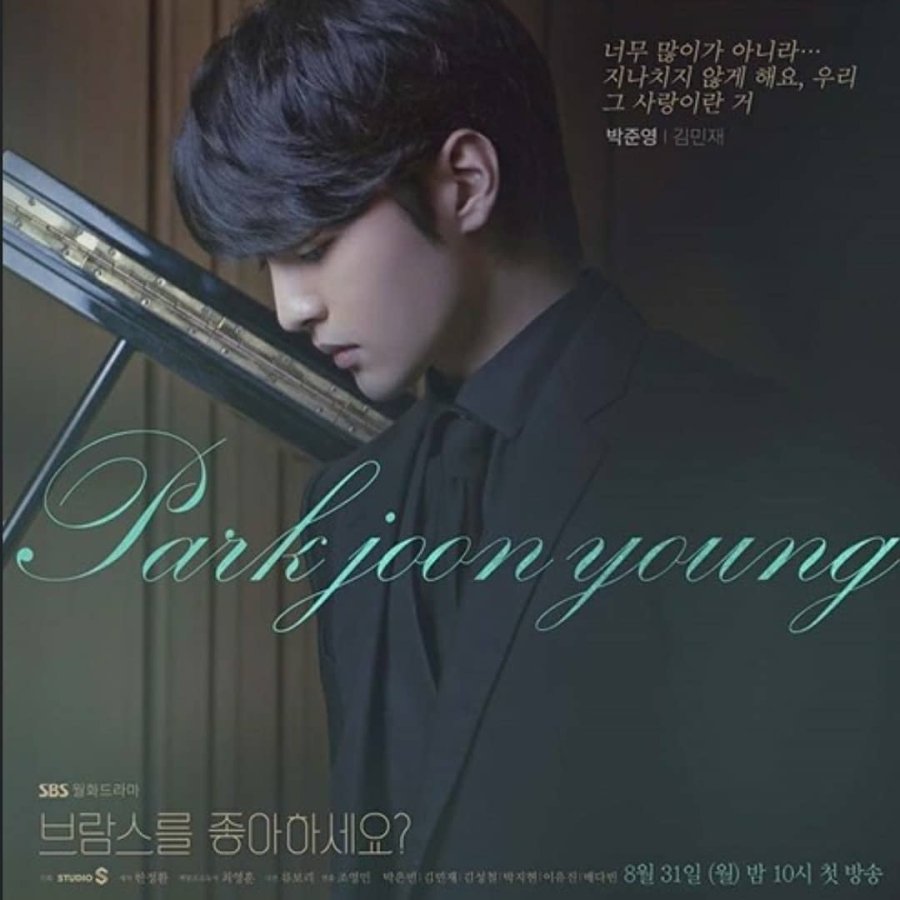 |
| After majoring in business and realizing she loves playing the Violin, Song Ah decided to attend a music school where she's seven years older than her classmates. She's constantly reminded that she's "too late" to make music her profession, but she believes that her sheer love and passion for the violin will help her succeed. | On the other hand, Joon Young is a talented pianist who started playing the piano when he was six. By the start of the drama, he's already a renowned musician. However, we soon learn that in the pursuit of success, he lost his love for the instrument and it has become a chore to play the piano. |
| Given the premise and direction of most of the Drama, you'd think the plot would be about Song Ah kickstarting her Violin Career while reminding Joon Young of his lost love of music and, thereby, reigniting his dwindling career, right? Well, unfortunately, the screenwriter Ryu Bo Ri had a different idea. Or, more accurately, Song Ah's dreams weren't really as important. While Joon Young did recover his love of music and became popular again in the music world; Song Ah gave up on the violin and became a music event planner instead. We even got one last scene showing her helping Joon Young pack for a tour... And that's because this story was, apparently, never really about Song Ah. This was a story about Joon Young which is why his journey concluded by overcoming his hurdle and climbing to a better spot than where he'd begun. Song Ah was simply a facilitator that allowed him to recover his love for music; while she stayed in the same spot where she began. Now, perhaps you think this is an isolated example of a Drama that disregarded the Female Lead's dream. Unfortunately, it is not. You can find a similar treatment of the Female Lead (wherein she either forgoes her dream, changes it, or she ends up putting it aside for plot-reasons) in the following dramas: Angel's Last Mission: Love (doesn't really reignite her ballerina career), Are You Human Too? (doesn't become an MMA fighter again), Bad Papa (gives up on becoming a writer), Because This is My First Life (doesn't take back her screenwriting career), Come and Hug Me (doesn't really become an acclaimed actress), Do Do Sol Sol La La Sol (doesn't continue her piano career, nor does she become a renowned teacher), Doctor John (she regresses as a Doctor until the ML returns), Dr. Romantic (her dream becomes doing surgery with the ML, her teacher), Fight For My Way (she gives up on becoming a news anchor and becomes an MMA announcer instead), The Last Empress (doesn't continue her acting career), Haechi (she becomes the ML's bodyguard rather than continue her detective career), Into the Ring (doesn't pursue a political career and basically returns to the same spot where she began), Jealousy Incarnate (gives up on being a news anchor), It's Okay to Not Be Okay (gives up her writing career with one last book), Love in Sadness (doesn't become a successful artist), Thirty But Seventeen (gives up the violin), Soul Mechanic (doesn't recover her acting career), Zombie Detective (becomes a Private Detective like the ML rather than continue her career at the newspaper), Vagabond (gives up on her career as an agent), Wok of Love (the ML's dream becomes her dream), Itaewon Class (the ML's dream becomes her dream), The Nokdu Flower (gives up on her revenge), The Greatest Love (doesn't become an A-Lister star), and The Nokdu Flower (doesn't really accomplish her dream), to name a few that I recall. Though I'm sure there may be a lot more. | |
So basically... | |
 |  |
There are certainly other differences between how the genders are treated by writers that were not explored or hinted at in this article. If so, I hope you share them in the comments down below.
With that said, the series of articles that made up "Analyzing Tags: Romance in K-Drama" comes to an end after more than a year of working on them.
I hope you had fun reading them or, at the very least, that you found them interesting enough to provide some food for thought the next time you watch a K-Drama. Regardless, thank you all very much for reading and joining the conversation! Until we read each other again, take care!
Merry Christmas & Happy New Year!
Editors: BrightestStar (2nd editor)


